
|
Getting your Trinity Audio player ready...
|
Introduction by Oe Kenzaburo
When I wrote The Silent Cry, I sought to confront the deep contradictions within the human heart: violence inherited across generations, the fear and love between brothers, and the silence of memory that demands to be heard.
In moving this story from a Japanese village to the hollows of Appalachia, what emerges is not a distortion but a recognition. These mountains, too, carry histories of uprising and repression, of men who bled for survival, and of families who carried the weight long after the shots were fired.
The setting may change, but the silence is the same. The cry, though unspoken, echoes across lands, across languages, across time.
(Note: This is an imaginary conversation, a creative exploration of an idea, and not a real speech or event.)
Chapter 1 — The Father’s Death and Return Home
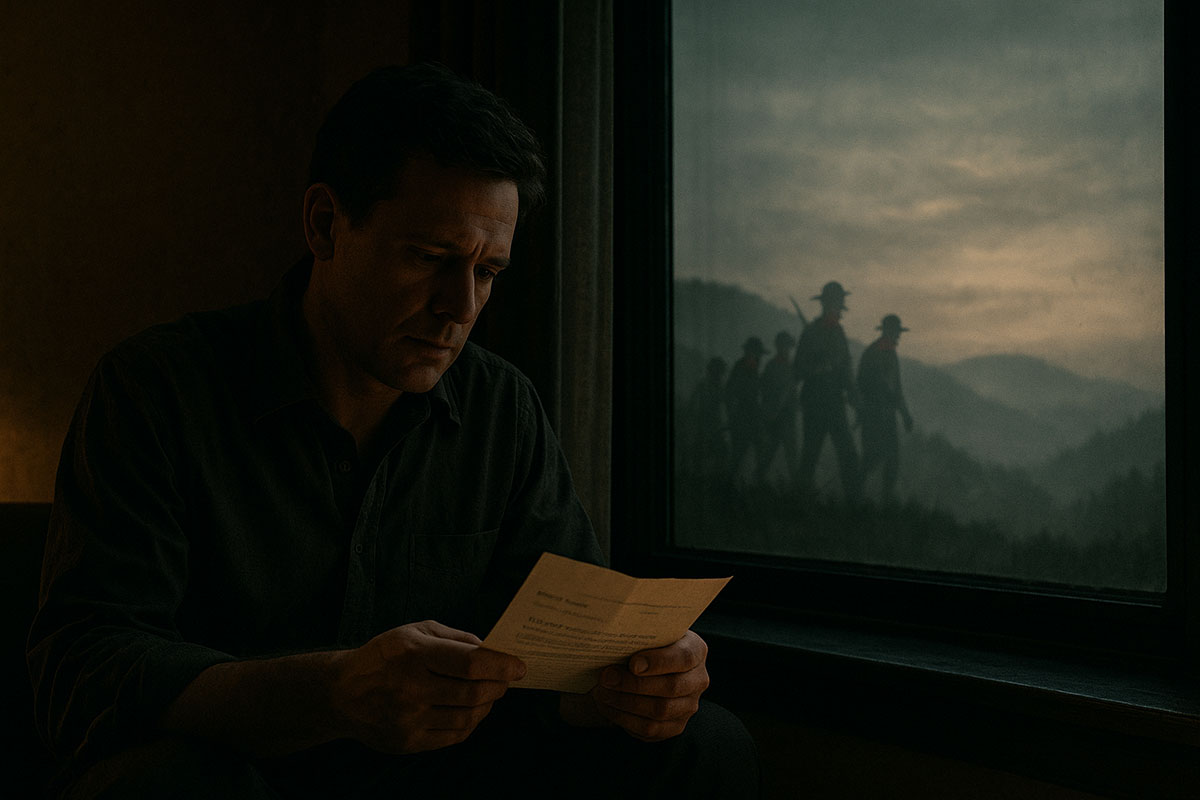
Setting: New York City → Logan County, West Virginia (Appalachia)
Scene 1 — Writer’s Apartment
INT. NEW YORK CITY — LOFT APARTMENT — NIGHT
Stacks of manuscripts, a glowing laptop, empty mugs.
SAM MILLER (40s, sharp-eyed, exhausted) scrawls in a notebook. City hum seeps through a cracked window.
The BUZZER sounds. A courier hands him a yellow envelope. Sam opens it.
Sam (reading under breath)
“…Father passed away. Funeral in Logan County, West Virginia.”
His wife, EMILY (30s, steady, perceptive) stops folding laundry and looks over.
Emily
We’ll have to go back.
Sam lights a cigarette. No reply.
Scene 2 — Departure
EXT. PENN STATION — LATE NIGHT
Harsh fluorescents, rushing travelers. Sam, Emily, and their kids—JACK (10) and LILY (7)—haul suitcases toward the Amtrak.
Sam pauses at the edge of the platform, staring into the dark tunnel.
Sam (V.O.)
I thought I buried that place. His death drags me back anyway.
Doors close. The train pulls into the night.
Scene 3 — The Train Ride
INT. AMTRAK — PRE-DAWN
The family shares a booth.
Jack pulls a battered football from his bag and rolls it to Lily. She giggles; it thumps against Sam’s arm.
Each dull thud echoes like a far-off drum.
Sam watches his reflection blur into passing fields and abandoned barns.
Scene 4 — Into Coal Country
EXT. LOGAN COUNTY BACK ROADS — DAWN
They transfer to a cousin’s rusted pickup. The road twists through hollers and ridgelines.
Faded billboards: JESUS SAVES. GUN SHOW SATURDAY.
A shuttered tipple, a leaning trailer, a creek the color of iron.
In the backseat, the kids bounce the football.
Thud. Thud. Thud.
Sam’s jaw tightens.
Scene 5 — Town Arrival
EXT. SMALL TOWN, LOGAN COUNTY — MORNING
Boarded storefronts. A church bell tolls.
Old-timers outside a diner watch the truck roll past, eyes narrowed.
Emily (low)
Feels like they knew we were coming.
Sam doesn’t look over. Keeps staring ahead.
Scene 6 — The Miller House
INT. FAMILY PARLOR — AFTERNOON
Dim light through lace curtains; wallpaper the color of old nicotine.
A coffin. ROBERT MILLER lies surrounded by lilies and family photos.
DAVID MILLER (50s, stern, a local preacher) kneels in prayer, rises as Sam enters.
David
So the city boy finally comes home.
Sam bows his head at the coffin. Says nothing.
Scene 7 — Backyard
EXT. BEHIND THE HOUSE — LATE AFTERNOON
Jack and Lily toss the football across patchy grass. Their laughter briefly warms the air.
A wild throw lands in a mud patch. The ball sinks and doesn’t bounce back.
From the porch, Sam watches.
Sam (to himself)
Nothing keeps rolling forever.
Scene 8 — The Vigil
INT. PARLOR — NIGHT
Relatives crowd the room—casseroles, paper plates, cheap beer. Stories ripple: some kind, some not.
EARL JOHNSON (70s, grizzled neighbor) leans forward, voice rough as gravel.
Earl
Your daddy carried something heavy. Older than any of us. These hills remember blood—miners, company men, law, and folks caught between. Your kin were right in it.
Silence.
Sam stares into his glass. The drum is back—faint, insistent.
Final Shot, Chapter 1
EXT. MAIN STREET — MIDNIGHT
Sam walks alone under flickering streetlamps.
Somewhere, unseen children laugh. The sound blends with the distant march of boots and a slow drumbeat.
ON-SCREEN TITLE: The Silent Cry
FADE OUT.
Chapter 2 — Family Reunion and Rising Tension
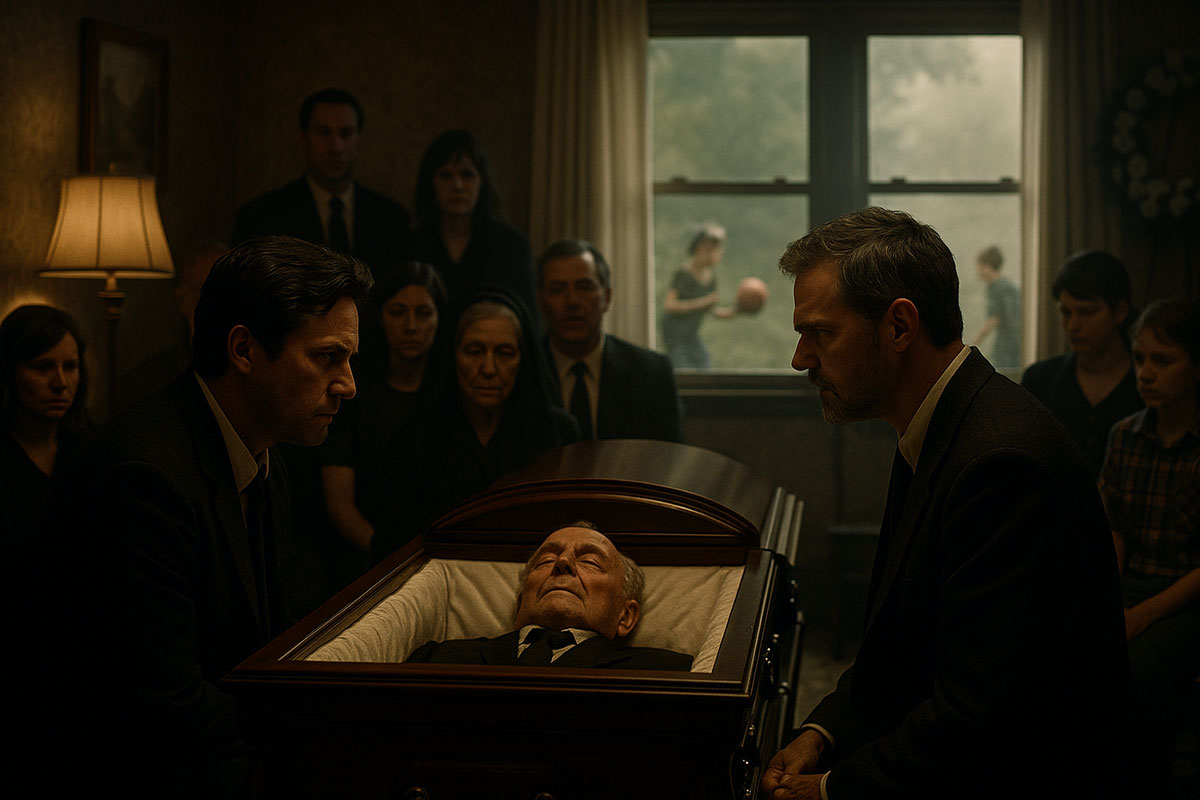
Scene 1 — Funeral Morning
INT. MILLER HOUSE — PARLOR — MORNING
Sunlight filters through lace curtains, dust floating in the air. The coffin rests in the center of the room, surrounded by folding chairs.
Villagers file in — neighbors in worn suits, women in modest dresses. They murmur quietly, their eyes flicking toward SAM and EMILY.
WHISPERED VOICES (background)
“The one who made it out, writing books up in New York.”
“Left his brother here to carry it all.”
“Not much of a Miller anymore.”
Sam adjusts his tie, ignoring them. He lights a cigarette, but Emily gently plucks it from his lips.
Emily (quietly)
Not here.
Scene 2 — Hallway Confrontation
INT. HALLWAY — LATER
Sam crosses paths with his brother DAVID, dressed in a black preacher’s suit. The tension is immediate.
David
Did you ever honor him, Sam?
Sam
…Honor? I feared him.
David
Then you feared being his son.
Their eyes lock. The silence is sharper than any words.
Scene 3 — The Town’s Eyes
EXT. MILLER HOUSE — YARD — AFTERNOON
Men from town chop wood for the wake, women arrange food. The children toss their football in the yard.
A local man eyes Sam and smirks.
Neighbor
Bet city life’s got you forgetting what hard work looks like.
Sam forces a smile, walks away. The ball sails through the air — caught mid-laugh by JACK. A brief flicker of joy softens the air, then fades as adults resume their chatter.
Scene 4 — Outsider’s Burden
INT. KITCHEN — EVENING
Emily helps women prepare dishes. Their smiles are polite but stiff.
Townswoman
City must feel a lot bigger than Logan County. Don’t know how you stand the quiet out here.
Emily smiles faintly, her hands busy. Through the window, she sees Sam surrounded by relatives, his posture tense. She feels the weight of being unwelcome.
Scene 5 — Wake Tensions
INT. PARLOR — NIGHT
Relatives fill the room, food and liquor passed around. The air grows heavy.
David stands, his voice commanding.
David
Father’s will lives on in me. This house, this family, this town — it’s mine to keep. But you, Sam — you share his blood. You don’t get to walk away from that.
All eyes turn to Sam. He sits still for a moment, then leans forward.
Sam
All I ever wanted was to get free of it. The land, the fights, the damn curse.
The room stills. Someone coughs. The football sits in the corner, half-hidden, as if listening.
Scene 6 — Husband and Wife
EXT. BACK YARD — LATE NIGHT
Sam and Emily step out under a pale moon. Crickets sing. The distant highway hum is faint.
Emily
What do you want, Sam? To run again? Or to fight it?
Sam
I thought I’d left it behind. But his death… it pulled me back in.
Emily touches his arm gently. He exhales, heavy with memory.
Final Shot, Chapter 2
EXT. YARD — DAWN
The next morning. Mist clings to the grass. The football lies in the mud, dew glistening on it.
Sam stands over it, unmoving, as if the ball itself carries the weight of generations.
FADE TO BLACK.
Chapter 3 — The Memory of the Uprising
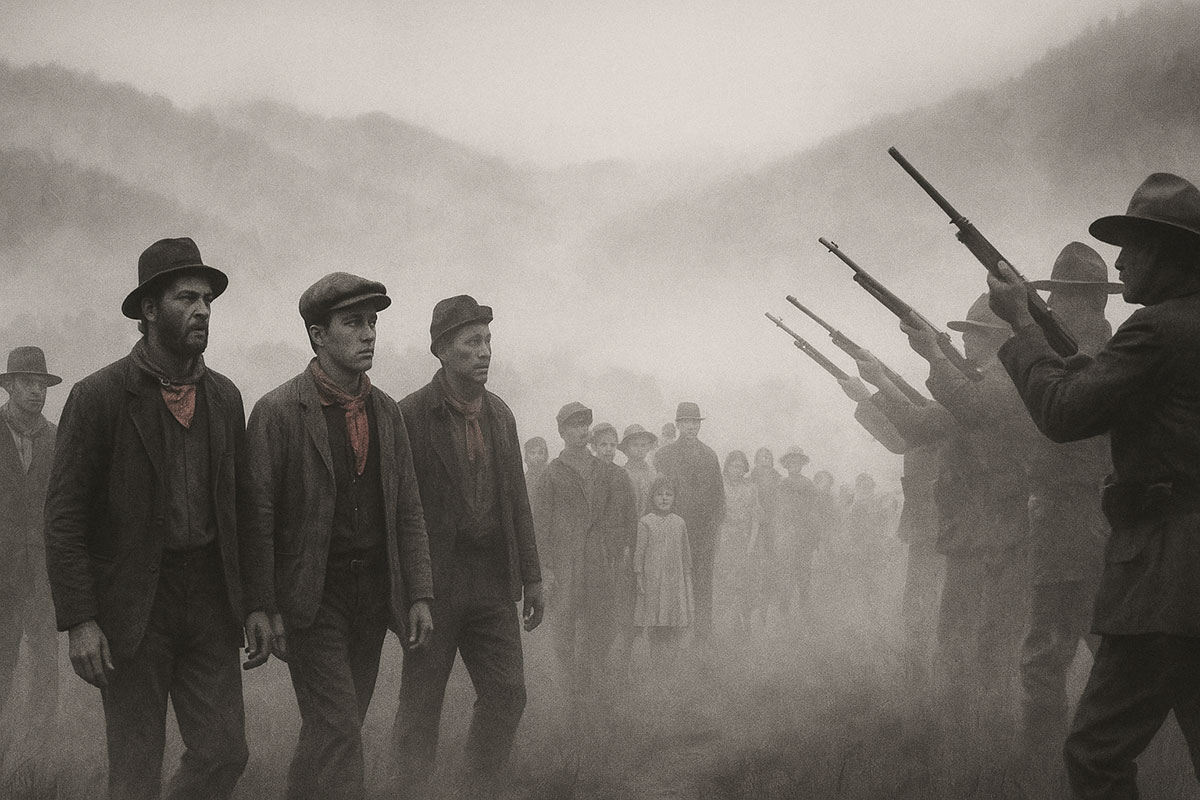
Scene 1 — Stories the Hills Remember
INT. MILLER HOUSE — PARLOR — NIGHT
The wake is thinning out. Paper plates stacked, coffee gone cold.
EARL JOHNSON (70s, grizzled) leans in toward SAM, voice low and rough.
Earl
Back in ’21, men tied red bandanas ‘round their necks, marched these ridges for a fair wage. Company men and deputies met ’em with rifles. Folks like your granddad chose sides. Everyone bled.
Sam’s eyes flick to an old photo on the mantle: miners caked in coal dust, faces unreadable.
Earl (continuing)
That kind of thing don’t disappear. It just goes quiet. Lives in the dirt. In the blood.
Sam swallows hard. Somewhere in the distance, a mine whistle moans like a ghost.
Scene 2 — Night Terrors
INT. SAM & EMILY’S ROOM — LATE NIGHT
Moonlight slices across the bed. EMILY sleeps; SAM stares at the ceiling.
He closes his eyes.
CUT TO: DREAM — BLACK & WHITE / GRAINY
EXT. RIDGELINE — 1921 — DAY (DREAM)
Hundreds of miners snake along the ridge, red bandanas at their throats, lunch pails banging against their legs.
Women and children trail behind with bundles; a drumbeat rises from somewhere unseen, mixing with marching boots.
On the opposite ridge, company guards and deputies take positions. A Baldwin–Felts agent chews a toothpick, bored and cruel.
A shot rings out. Then a storm of gunfire.
Sam stands in the middle of it, an observer no one sees. A child drops a leather football—it tumbles down the slope, streaking through coal dust until it’s slick with mud that looks like blood.
Sam reaches for the ball—his hands come up black.
CUT BACK TO:
Scene 3 — Waking
INT. SAM & EMILY’S ROOM — PRE-DAWN
Sam bolts upright, gasping. Sweat-soaked.
Emily (half-awake)
Bad dream?
Sam
Not a dream. It’s… this place remembering.
Emily reaches for his hand; he lets her hold it, looking away like the room itself is haunted.
Scene 4 — The Memorial
EXT. MINERS’ MEMORIAL — MORNING
Fog clings to a little hillside clearing: a worn stone monument with names chiseled shallow; a rusted lamp welded on top like a crown.
Sam approaches alone. He brushes grit from a name—MILLER.
He lays his palm flat on the stone.
The air thickens. The mine whistle keens. A faint drum returns—barely there, like a heartbeat.
Sam shuts his eyes—
FLASH: BLACK & WHITE
—faces shouting, men in caps charging, a woman screaming a name Sam almost recognizes—
CUT BACK: COLOR.
Sam staggers back, breathing hard.
Scene 5 — Church and Order
INT. SMALL CHURCH — LATE MORNING
DAVID (in his preacher’s suit) adjusts hymn numbers. SAM lingers near the doorway, hat in his hands.
David
You look like you seen a ghost.
Sam
Maybe I did. A whole line of them.
David (firm)
Then hear me: ghosts leave when you shut the door on sin and chaos. This town needs order, Sam. Not old tales stirred up.
Sam
Order’s just another word for someone’s boot on someone’s neck.
David’s jaw tightens. A church bell claps, sharp as a warning.
Scene 6 — Earl’s Ridge
EXT. OVERLOOK ABOVE THE HOLLOW — AFTERNOON
Earl leads Sam along a narrow deer path. The valley yawns below: trailers, a shuttered tipple, a creek running iron-red.
Earl
When the march reached these parts, lawmen fired from that cut. Couple men fell. Folks say the dirt still coughs up bullets after heavy rain.
They stop at a shallow trench half-swallowed by weeds.
Earl (quiet)
I ain’t telling you this so you can write another story for city folks. I’m telling you ‘cause your people were here. Maybe on both sides. Most were.
Sam kneels. His fingers rake the soil and come up stained. He doesn’t speak.
Scene 7 — Kitchen Window
INT. MILLER HOUSE — KITCHEN — LATE AFTERNOON
Emily washes dishes with the townswomen. Polite smiles; sideways glances.
Through the window, she sees JACK and LILY in the yard, trying to clean the muddy football with a hose. The water runs reddish into the grass.
A woman beside Emily murmurs:
Townswoman
This place gets under your nails. Stays there.
Emily nods, eyes on her kids. She forces a smile that won’t hold.
Scene 8 — Brother’s Warning
INT. HALLWAY — DUSK
Sam passes David in the narrow hall.
David
Father kept the peace best he could. Don’t dig where he chose not to.
Sam
He chose what to see. That’s not the same as peace.
David (low)
You stir this up, you’ll drown us all in it.
They stand chest to chest a beat too long. Footsteps elsewhere break the spell.
Scene 9 — The Ball
EXT. BACKYARD — TWILIGHT
The children have left the football to dry on the porch rail. Sam picks it up. It’s still damp, the laces darkened.
He turns it in his hands. For a second, his reflection in the porch window is not his own—it’s a miner’s face, blackened, eyes hollow.
Sam flinches. The image is gone. He clutches the ball to his chest.
Final Shot, Chapter 3
EXT. RIDGELINE — NIGHT
Darkness over the hills. A wind lifts, raking the trees.
From somewhere far off: the slow thud of a drum. The faint tramp of marching feet. Then silence, as if the mountain itself is holding its breath.
FADE OUT.
Chapter 4 — Confrontation with the Brother (
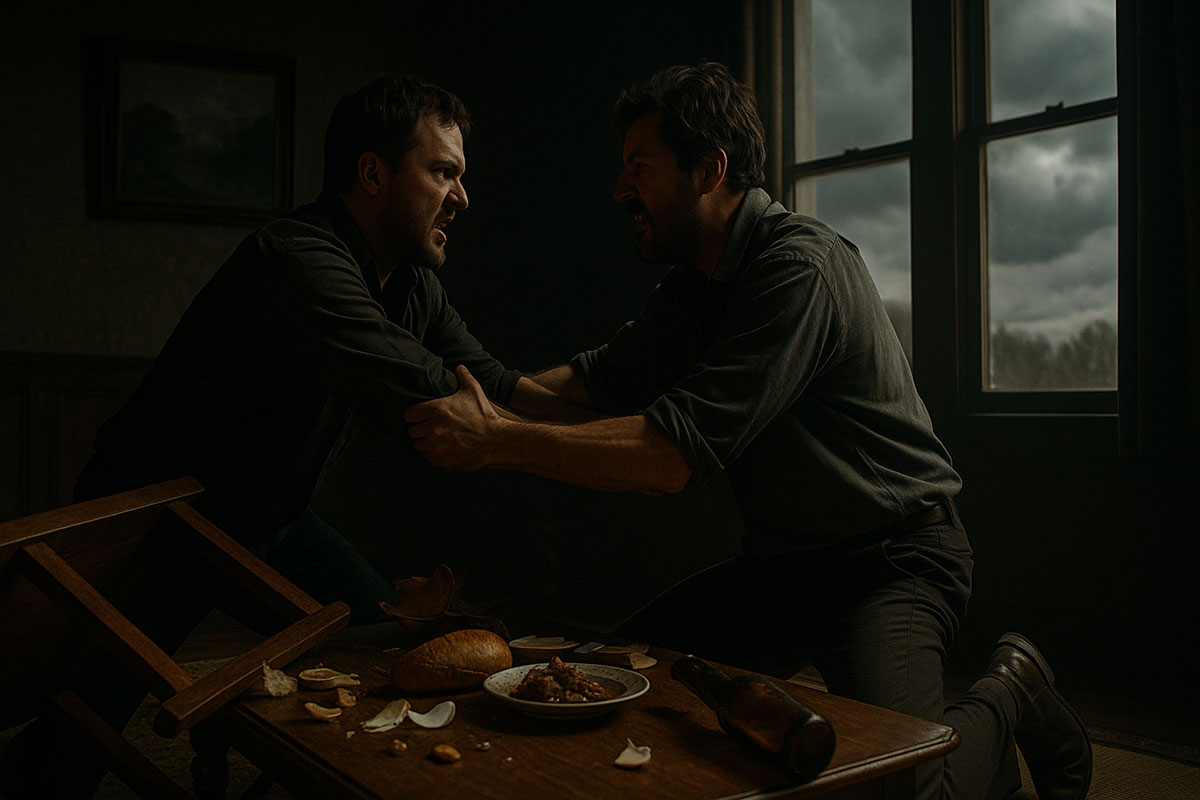
Setting: Logan County, West Virginia — Miller house, church, and surrounding holler.
Scene 1 — Father’s Papers
INT. MILLER HOUSE — ATTIC — MORNING
Dusty rafters, boxes stacked, light slanting through warped boards.
SAM pries open a trunk: inside, ledgers, folded sermons, a bundle of old strike notices.
One page stained with coal dust and blood: “Deputized to put down unlawful gatherings…” signed Robert Miller.
Sam’s hands shake. He hears boots in the stairwell.
DAVID appears in the doorway, voice cold.
David
Put it back.
Sam
He was part of it, wasn’t he? Not just a bystander.
David strides forward, snatches the papers, shoves them into the trunk.
David
Father kept the peace. That’s what mattered.
Sam
Peace? You mean fear.
Their faces hover inches apart, air thick with unspoken rage.
Scene 2 — The Preacher’s Claim
INT. PARLOR — AFTERNOON
Relatives gather, uneasy. Sam and David stand across the room.
David
Without chains, men tear each other apart. These hills taught us that. Order is God’s hand.
Sam
Order’s just the boot that keeps you bowed. That’s not God. That’s power.
Murmurs ripple through the relatives.
Emily clutches Lily’s shoulders. Jack stares wide-eyed.
David slams his fist on the table.
David
This family stands because I held it up. And you—
(pointing)
—you wrote yourself out of it.
Sam (furious)
I wrote the truth. And that’s what you can’t stomach.
Scene 3 — Emily’s Confession
EXT. BACK PORCH — EVENING
Emily sits on the steps, staring at the hollow. Sam joins her, slumped.
Emily
This place is swallowing you both. You’re fighting ghosts, Sam. And you’ll drown if you keep at it.
Sam
They’re not ghosts. They’re in us. In the dirt. In my blood.
Emily takes his hand, trembling.
Emily
Then don’t let it pass to our kids.
Scene 4 — The Wake Erupts
INT. PARLOR — NIGHT
The room is crowded again, food and liquor flowing. The air is volatile.
David rises, voice booming like a sermon.
David
This family belongs to God and to order. Our father’s name demands it.
Sam rises too.
Sam
No. It demands honesty. Even if it shames us.
The crowd stiffens. Voices overlap, arguments flare.
A casserole dish slips and shatters.
David lunges, shoving Sam. The two brothers crash into the table—dishes exploding, beer spilling, children screaming.
Relatives try to separate them. Emily pulls at Sam’s arm.
David (snarling)
You’ll never outrun the blood, Sam!
Sam shoves him back, chest heaving, sweat on his brow.
Scene 5 — The Storm
EXT. OUTSIDE THE CHURCH — NIGHT
Thunder rolls over the hollow. Sam staggers through the rain, soaked, fists clenched.
The church looms, lit from within. Hymns leak out, distorted by storm.
He stops in the road, staring at the steeple.
Sam (V.O.)
I turned my back on him, on this place, on all of it. But what if it’s carved in me?
The football rolls into view, carried by runoff water, muddied and red. Sam picks it up, cradles it. His reflection in its wet leather twists into a miner’s face.
Final Shot, Chapter 4
EXT. HILL ABOVE THE HOLLOW — NIGHT
Sam stands on the ridge, clutching the ball, lightning flashing behind him.
From the valley, the faint sound of a drum rises, joined by boots marching—not real, but deafening.
FADE TO BLACK.
Chapter 5 — Memory and Violence Explode
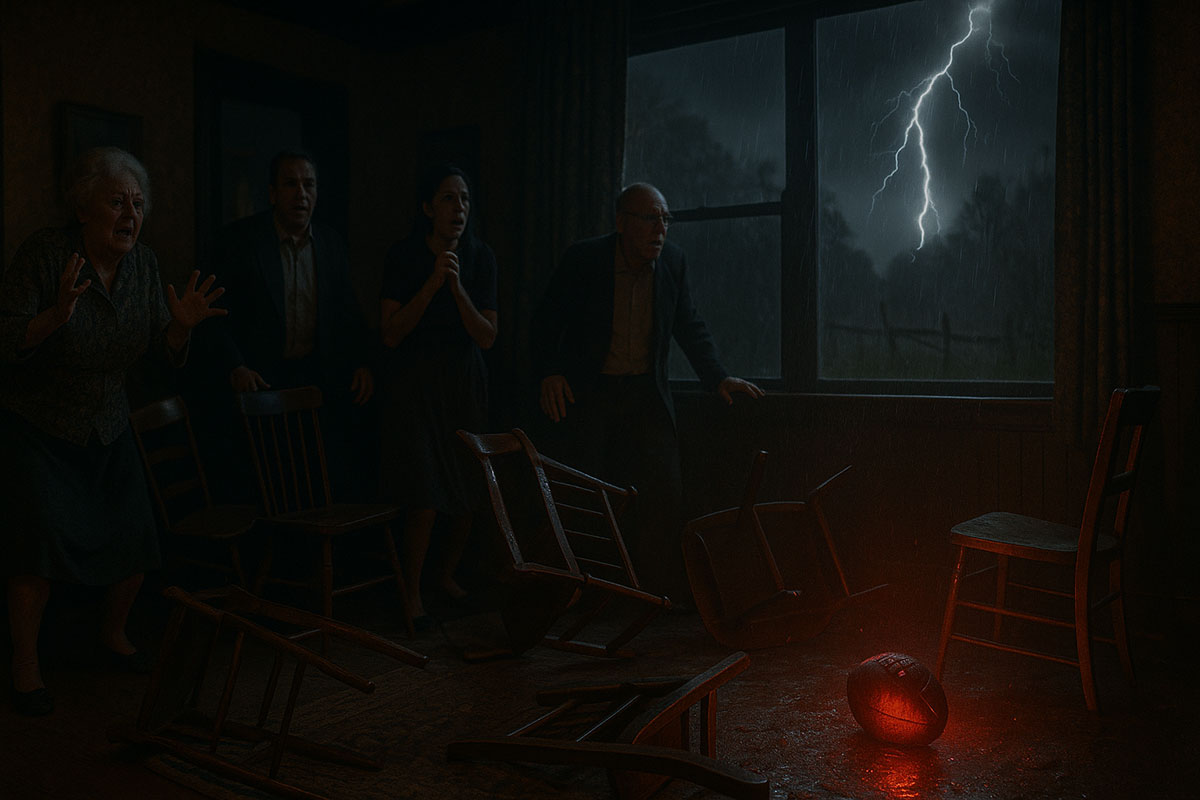
Scene 1 — The Gathering
INT. MILLER HOUSE — PARLOR — NIGHT
The wake has turned restless. Too many people, too much liquor. The room swells with whispers, nervous laughter, heavy silence between.
SAM sits off to the side, staring into his drink. DAVID presides like a preacher, upright, controlling.
An UNCLE, slurring from whiskey, leans close to Sam.
Uncle (muttering)
Your daddy… he wasn’t just prayin’ for peace. He swung with the company men. Folks never forgot.
Gasps. Murmurs. David slams his glass down.
David
That’s enough. You shut your mouth.
Sam rises, his voice steady but low.
Sam
He fought against his own people. And you’ve spent your life covering it.
Scene 2 — The Accusation
INT. PARLOR — CONTINUOUS
The relatives freeze. The air is electric.
David (roaring)
He was chosen to hold the line! To keep order when men lost themselves to chaos!
Sam
He was chosen to pull the trigger! That’s what you can’t admit.
Emily pulls LILY and JACK close, shielding them. Dishes clatter as people back away.
David lunges at Sam. The brothers crash into the table, casseroles and beer exploding onto the floor.
Scene 3 — The Fight
INT. PARLOR — NIGHT
The room is chaos — chairs toppling, women screaming, children crying. Relatives scramble to pull them apart.
Sam pins David for a moment, fists trembling, eyes wild.
Visions blur over reality — miners in bandanas, gunfire on ridgelines, a child’s ball rolling down a coal-dust slope slick with blood.
Sam raises his fist, ready to strike.
Emily (screaming)
Sam! Stop! Don’t let it take you too!
Sam freezes, his fist shaking inches from David’s face. Tears mix with sweat. His hand falls. He shoves himself off David, staggering back.
Sam (hoarse)
…It’s in me too. The same damn curse.
Scene 4 — Flight into the Storm
EXT. MILLER HOUSE — NIGHT
Sam bursts through the door into pouring rain. Lightning tears the sky above the hollow.
He stumbles into the mud, gasping. His hands tremble as thunder rolls like cannon fire.
The football lies in the yard, half-submerged in muck. It glows slick, the leather dark as blood.
Sam picks it up. In its sheen, he sees a miner’s face staring back — hollow eyes, mouth opening in a silent scream.
Sam (V.O.)
This blood is mine. It always was. But it doesn’t have to spill again.
Scene 5 — Emily’s Plea
EXT. BACKYARD — CONTINUOUS
Emily runs out, soaked through, clutching Jack and Lily behind her. She kneels in the mud beside Sam.
Emily (pleading)
You’re a father too. Don’t let their ghosts drown you. Show them another way.
Sam stares at the football in his hands, then at his children, their frightened faces glistening with rain. Slowly, he lowers the ball into the mud, letting the storm wash it clean.
Final Shot, Chapter 5
EXT. HOLLOW — NIGHT
The storm rages. Sam stands with Emily and the children, lightning framing them against the valley.
The sound of marching boots and drums swells again — but this time it doesn’t dominate. It fades beneath the sound of his children’s cries, raw and alive.
Sam closes his eyes. Rain streams down his face like tears.
FADE TO BLACK.
Chapter 6 — Carrying the Burden Forward
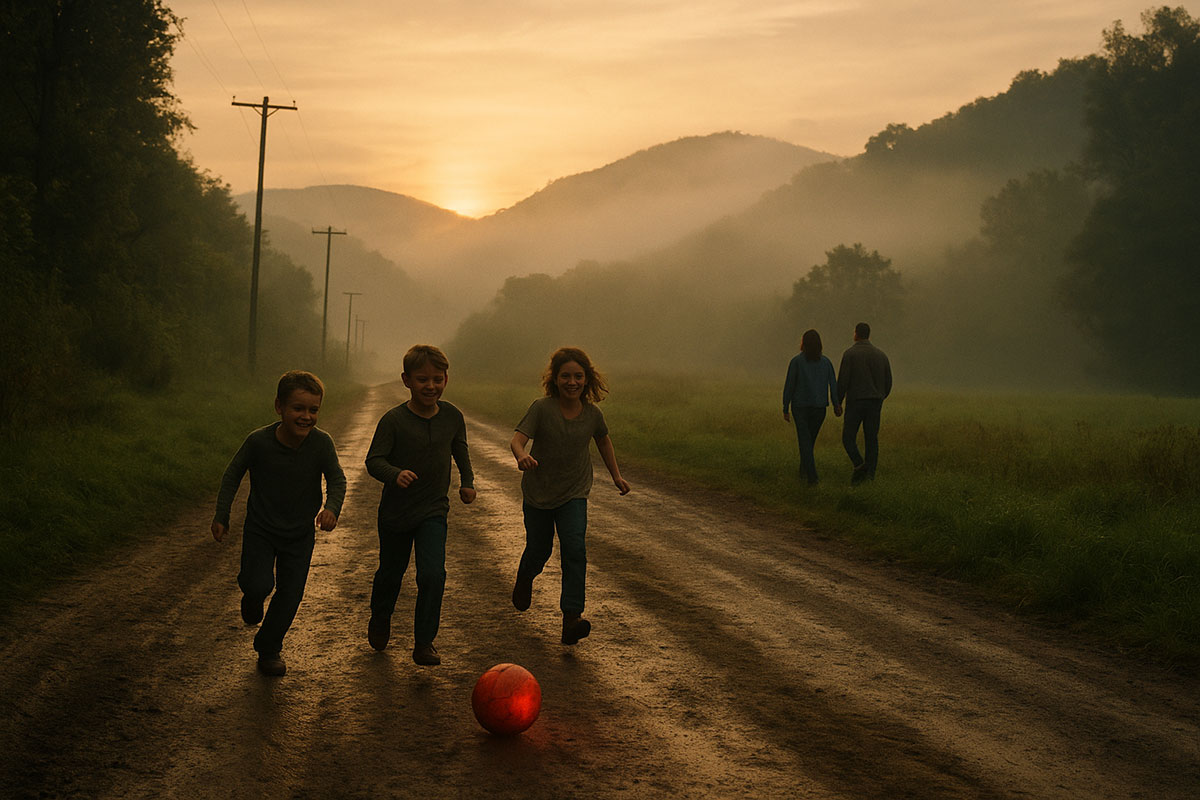
Scene 1 — After the Storm
EXT. MILLER HOUSE — DAWN
The storm has passed. Mist drifts low over the hollow; gutters drip.
SAM stands alone in the backyard, shoes sunk in wet grass. A sodden football lies where he left it, rinsed clean by the night.
Birdsong tests the morning.
Sam (V.O.)
You don’t bury the past. You learn how to carry it.
He bends, lifts the old ball. Water streams from the laces. He exhales—calm, not triumphant.
Scene 2 — The Memorial, Again
EXT. MINERS’ MEMORIAL — MORNING
Fog thinning. Sam approaches the stone. He sets the old ball at its base, like an offering.
He brushes grit from a MILLER name, then rests his palm there.
A faint mine whistle rises—and fades. No drums. Just wind.
Sam (softly)
I hear you. I’m still going on.
Scene 3 — Kitchen Light
INT. MILLER HOUSE — KITCHEN — LATER
Sun rinses the room pale gold. EMILY pours coffee. JACK and LILY hover in the doorway, studying Sam’s face.
Sam steps in, mud on his cuffs, eyes clearer.
Emily (quiet)
You with us?
Sam nods. He kisses her forehead; she breathes out for the first time in days.
He opens a closet, pulls down a fresh new football—sleek, unscuffed—hands it to Jack and Lily.
Sam
Outside. Let’s see what the morning can do.
The kids light up, darting out. Emily squeezes Sam’s hand—gratitude and relief.
Scene 4 — Brothers
INT./EXT. MILLER HOUSE — HALL / PORCH — CONTINUOUS
DAVID stands at the screen door, watching the yard. His sermon suit is gone; he wears a plain shirt, sleeves rolled.
Sam approaches. They’re a step apart, the screen between them like a thin wall.
Silence stretches.
David
You didn’t hit me.
Sam
I almost did.
David studies him—a slow, conceding nod.
David (low)
Father… did what he thought he had to.
Sam
So did the others.
Another beat. No apology. No embrace.
David
Keep them safe. (a glance to the yard) That’s your work now.
Sam
It always was.
Their eyes hold: not reconciliation—recognition. Sam pushes the door open; David lets it swing. They pass each other without touching.
Scene 5 — Mud Road
EXT. HOLLOW ROAD — LATE MORNING
Dappled sunlight. JACK and LILY punt the new football down a muddy lane, shoes splashing, laughter skipping across the hills.
Sam and Emily walk behind them at an easy pace. Sam watches the ball bounce, bounce—not perfectly, but it keeps rolling.
He stops, looks back toward town—church steeple, crooked trailers, the memorial just out of sight. He turns forward again.
Sam (V.O.)
The hills won’t forget. Neither will I. But the next step is mine.
He reaches for Emily’s hand. She takes it.
Scene 6 — The Lookout
EXT. RIDGELINE — MIDDAY
The family crests a small ridge. Below, the hollow opens in quiet green.
The kids set the ball down; it wobbles, settles, shines in the sun.
A breeze combs the treetops. For a heartbeat, the sound almost becomes marching feet—then it isn’t. Just leaves.
Sam closes his eyes, listening. When he opens them, the day is simply bright.
Final Shot
EXT. HOLLOW ROAD — CONTINUOUS
Close on the new football as Jack’s foot sends it forward. It sails, arcs, lands—and keeps rolling down the road.
Children’s laughter rises, clean and ordinary.
The camera slowly pulls back: Sam and Emily small in the vast green, the ridge lines nesting like waves, the sky clear.
ON-SCREEN:
The Silent Cry
FADE OUT.
END.
Final Thoughts by Oe Kenzaburo
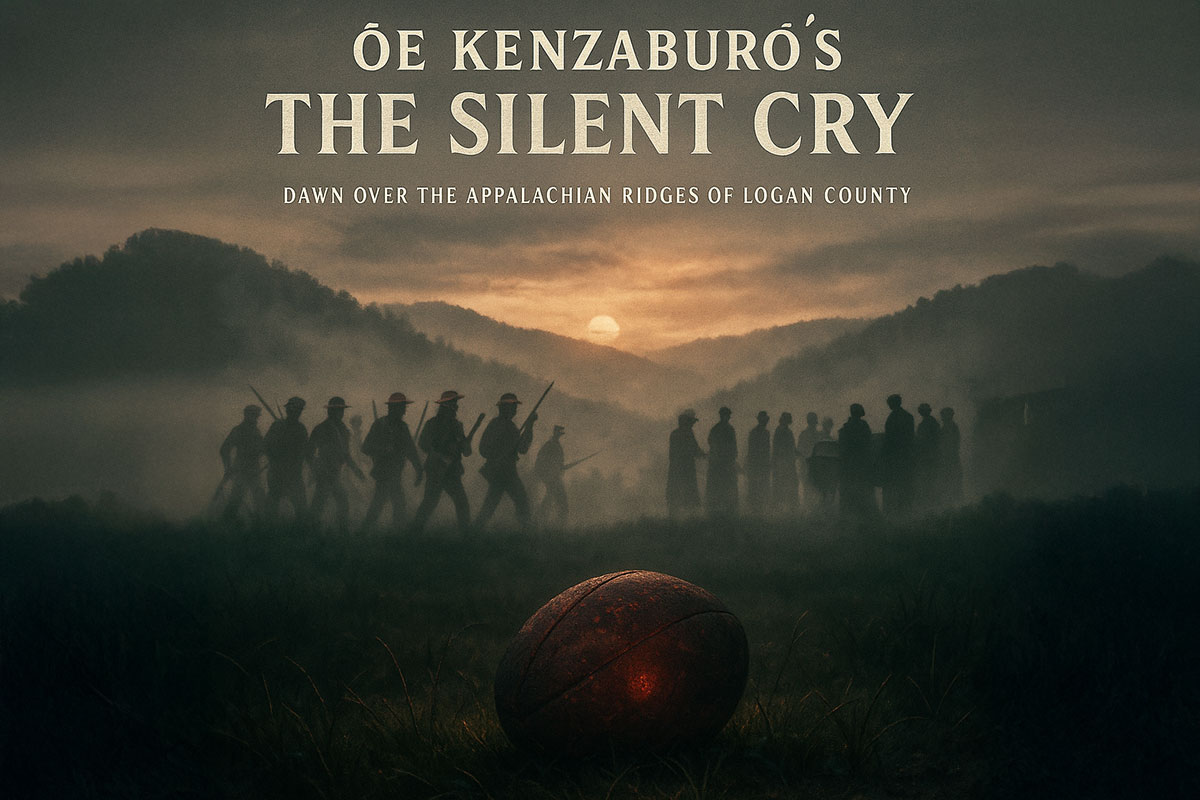
This story does not offer reconciliation, nor does it absolve the past. Instead, it asks us to live with the burden of history and still search for dignity in the act of carrying it. In Logan County, as in my own birthplace, the ghosts of the past walk beside the living. They shape us, but they do not have to decide our future.
If you find meaning here, let it be this: that the cry of history, silent though it seems, can guide us not toward despair but toward responsibility. And in that responsibility lies the fragile hope of another morning.
Short Bios:
Oe Kenzaburo (1935–2023)
One of Japan’s most important postwar novelists and the winner of the 1994 Nobel Prize in Literature. His works confront themes of memory, violence, moral responsibility, and the contradictions of modern life. The Silent Cry (1967) is among his most celebrated novels, exploring the darkness of history through the story of two brothers and the weight of inherited trauma. This Appalachian adaptation transposes his universal themes into America’s coal country, showing their resonance across cultures.
Samuel “Sam” Miller
A 40-something writer living in New York City who reluctantly returns to his hometown in Logan County, West Virginia, after his father’s death. Haunted by the legacy of the 1921 coal wars and by his own family’s complicity, Sam struggles between running from the past and confronting it.
David Miller
Sam’s older brother, a stern preacher who remained in Logan County to guard tradition and faith. He embodies the authority of the father and the community, clinging to “order” even at the cost of repeating past violence. His confrontation with Sam drives the story’s central conflict.
Emily Miller
Sam’s wife, an outsider in the Appalachian hollow. She sees more clearly than either brother how history is consuming them and becomes the moral anchor of the story, pleading with Sam to break the cycle for the sake of their children.
Jack and Lily Miller
Sam and Emily’s young children. Innocent and joyful, they symbolize the possibility of a future unshackled from the burdens of the past. Their football becomes the story’s central metaphor — sometimes heavy with blood, sometimes rolling freely in the morning light.
Robert Miller (deceased)
The brothers’ father, whose death brings the family together. Once deputized during the violent miner strikes, his legacy is one of silence and complicity. His shadow looms large over both Sam and David, sparking their struggle to interpret — or escape — what they have inherited.
Earl Johnson
An elderly neighbor who remembers the coal wars. Gruff and unpolished, he carries the community’s memory of violence and serves as a living reminder that history never disappears, it only lies buried in the hills.

Leave a Reply